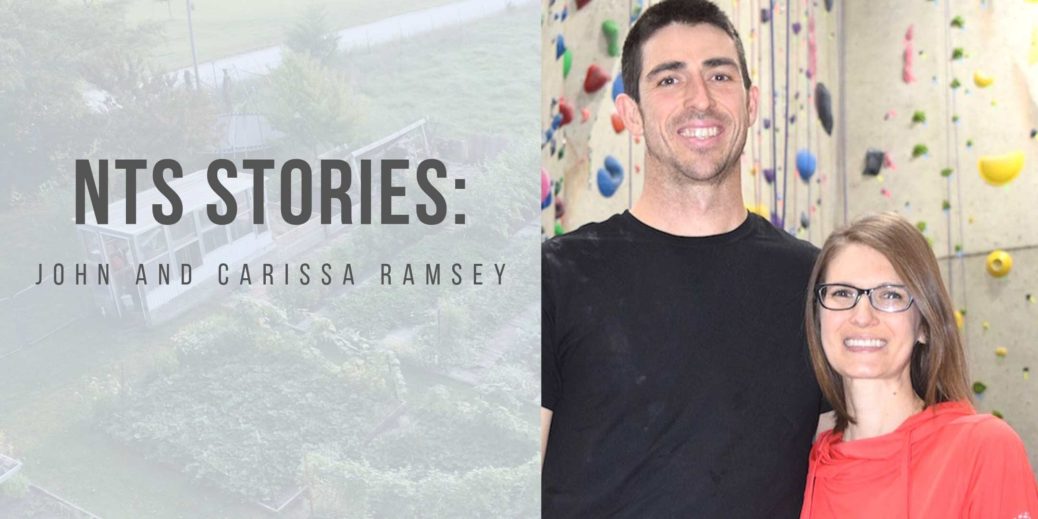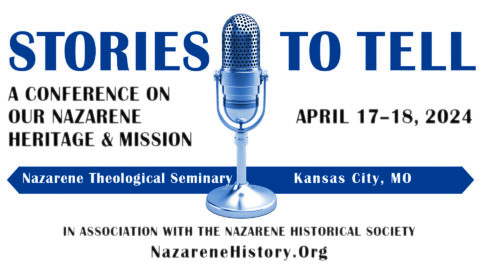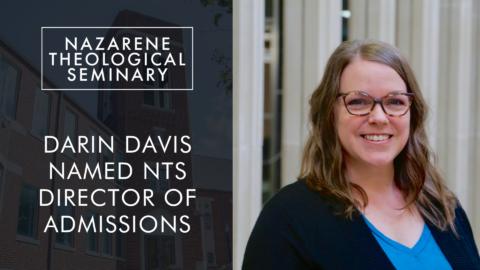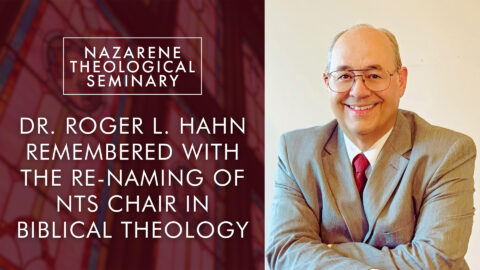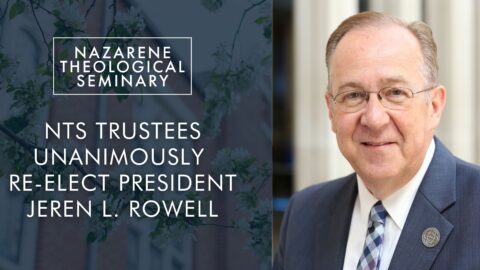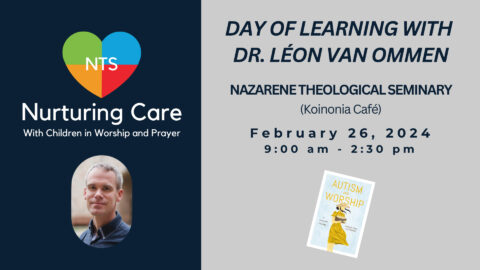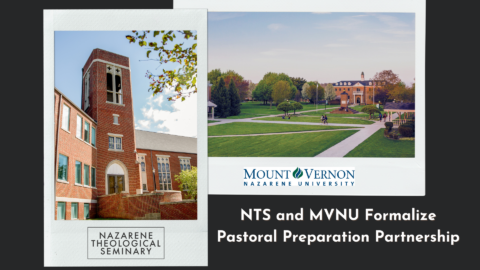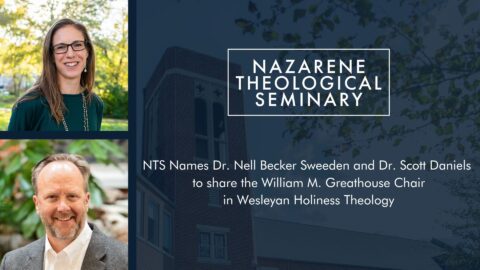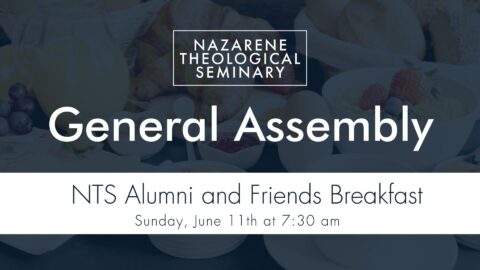NTS was recently able to interview Rev. John Ramsey, a 2012 graduate of the Master of Divinity program, and his wife, Carissa.
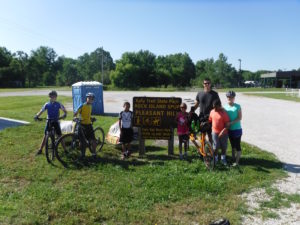 Tell us about yourself/your family.
Tell us about yourself/your family.
Carissa and I are southern California transplants to the mid-west. We met in high school, married young, and have been learning to live in fidelity to Christ, the Church, and each other since 2002. We have been blessed with the responsibility of raising five children; ranging in age from nine to fifteen, we are currently working our way through multiplication tables, driver’s permits and everything in between.
Outdoors is where we like to be. Cycling, hiking, rock climbing, soccer, gardening, snow shoveling, swimming; if it is outside, we’re happy. This summer all seven of us rode 190 miles on the Katy Trail, and the oldest boys and I reached the summit of Long’s Peak during a Colorado backpacking trip.
My favorite place to be is in the garden; a gift given to me by way of rural parsonage living. We raise a large garden each year, and I often half-joke with people that I’d rather be mistaken for a gardener than a pastor (since the risen Christ was supposed by Mary to be the gardener). Lately, I’ve been reading a lot of Wendell Berry, which helps me to appreciate rural life, connection to land, place, and community even more.
Carissa and I sustain the needs of our household by means other than solely the local congregation. She works at Children’s Center for the Visually Impaired in Kansas City, and I substitute teach in the local high school, bake artisan bread to sell through a CSA, and snow plow for a local landscape company.
How did you sense a call to vocational ministry?
Nazarene Youth Conference 1999 accomplished what it set out to do, by creating a space where I could clearly hear the Church say, “God calls women and men to vocational ministry.” Sure enough, beginning then as a vague notion of calling, God, through the people of God, began to nurture in me a desire to serve Christ and the world through the Church’s pastoral office. Education from PLNU and NTS, all while serving in defined roles in local congregations, helped me to more deeply understand calling. Today I continue to sense God’s calling and the Church’s affirmation on my life for vocational ministry.
Where have you served throughout your ministry?
Canaan Hill Church of the Nazarene (Lawson, MO), July 2005-present, co-pastor, 14 years.
What makes your current assignment unique? What do you love about it?
Canaan Hill is a faithful congregation bearing witness to the way of Jesus in a rural context. After 14 years of living with, and pastoring the same congregation, it is hard to think of the work as an assignment. It is a way of life. This life we share as pastors (Carissa and I are co-pastors) and people is beautiful. Our lives have become intertwined, and though we are humbled every time we are called pastor the most meaningful way to describe our relationship to the congregation is friendship. Our people are our friends: we share life together, they help us raise our kids, teach us new things, eat with us; there is a mutual trust between pastors and people that encourages us all to work together for the common good.
Our ministry at Canaan Hill has been marked by 3 primary emphases: catholicity, full participation for all, and works of mercy aimed at alleviating the effects of rural poverty. The primary means of grace by which we emphasize catholicity is the weekly celebration of Holy Communion. Worship in this way has been the catalyst for the other two emphases. Full participation for all is visible through the leadership of a pastor who is a woman, the intentional inclusion of children in everything we do, and the creativity of the laity in discerning where God is calling us to participate in God’s mission. The emphasis of alleviating rural poverty is rooted in the confidence that there is enough in God for all. This is learned and expressed as we receive Christ in Holy Communion and translates into open hands and open tables among our neighbors, specifically those suffering from poverty.
What are some of the unique blessings/challenges in your context?
Rural life is a blessing. Fourteen years ago Carissa and I moved from a 700 square foot condo outside of downtown San Diego to a parsonage on a ½ acre lot down a gravel road. In this context, we have learned the blessings of caring for the land and for the people who work the land. We have listened to the anecdotal stories of work and weather, and find ourselves telling the same stories as our own. We have sat with couples wrestling with the futility of rural life, and we have wrestled with the same regarding rural ministry.
Herein lies the challenge and the blessing: The small farm’s farmer’s widow, the retired factory worker, the quilting grandmother, the pastors of the small congregation, and the 100 year-old rural congregation which they pastor, all contemplate, “Why are we doing this?” The 90-year-old farmer still pulls weeds by hand in his pastures even though he readily admits that the kids will sell the farm, and the next owners will spray the fields to kill the weeds. But he doesn’t care; the way he cares for his pasture bears witness to what is right. The challenge and the blessing are the same: the seeming futility of being small. Therefore, our lives, who we worship and how we work, are not set on quantitative results but about bearing witness to what, and Who, is true, beautiful and good. In a culture of grandiose scarcity, we live a quiet, small life of abundance.
Are there ways in which your time at NTS especially helped prepare you for faithful and effective ministry?
NTS instilled within me a “humble confidence” that looks up and around with assurance that God, and God’s people are faithful. As a seminary, NTS accomplished its role in forming me as a minister of the Gospel who knows, in part, the breadth and depth of orthodox Christian tradition. From the vantage point of being a graduate of NTS, I am able to pastor as a “non-anxious presence” in a world of anxiety. I’ve been given the means to know the story and to tell the story in such a way that says to God’s people, “Peace, be still. This wind of doctrine or parody of the good life are mere innovations trying to dress-up an old attempt to undermine the way of Christ.” NTS made it clear to me that it is ok to evaluate ministry by decades, rather than years. Maybe longer than decades, maybe a good pastor is like many of the great artist; the work cannot be fully valued until more work can no longer be done.

